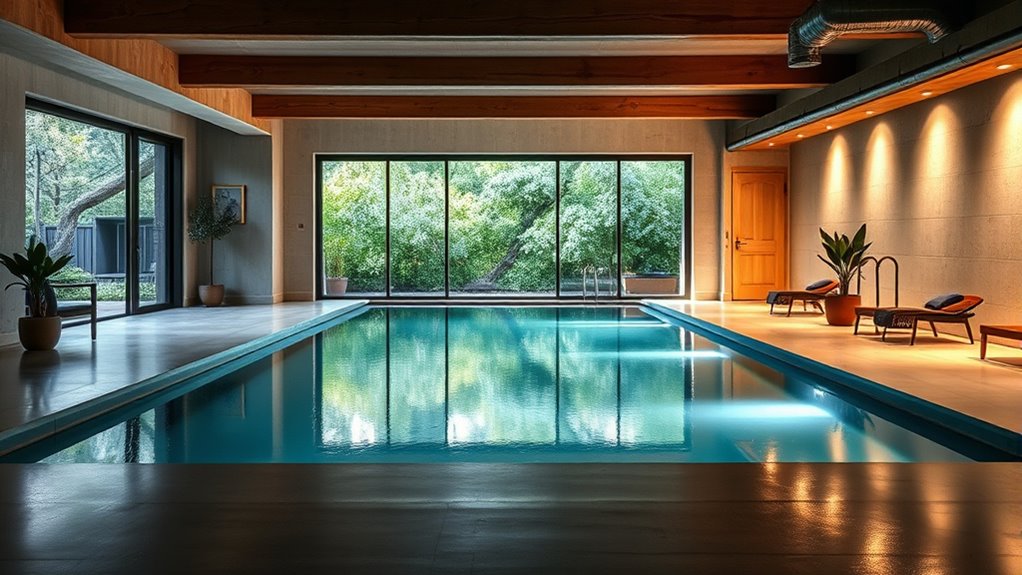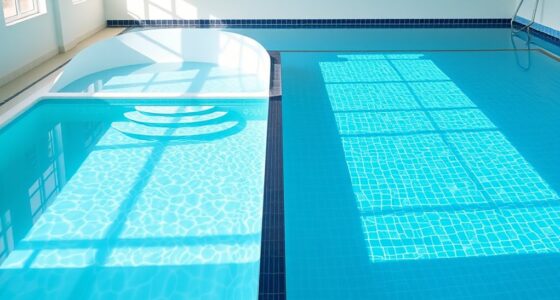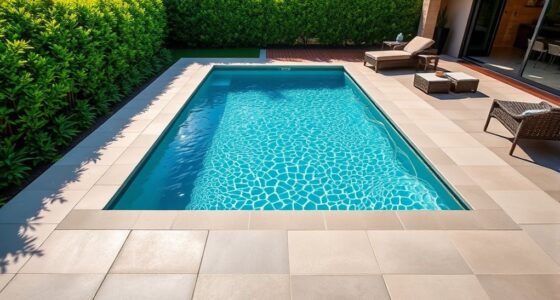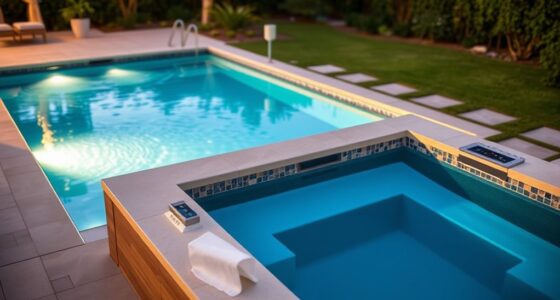Choosing between a basement and a garage for your endless pool depends on space, structural support, and moisture control. The basement offers a stable environment and easier access, but requires careful moisture and foundation checks. The garage provides quick access and better ventilation when properly insulated, yet may need more structural reinforcement. Considering your budget, privacy needs, and maintenance plans is key. Keep exploring to discover which spot best suits your setup and lifestyle challenges.
Key Takeaways
- Assess available space, structural capacity, and foundation support for both basement and garage options.
- Consider climate control, ventilation, and moisture management needs specific to each location.
- Evaluate accessibility, proximity to living areas, and ease of equipment maintenance for optimal placement.
- Factor in noise, privacy, and potential construction costs associated with remodeling or reinforcing spaces.
- Prioritize long-term maintenance, safety, and compliance with building codes for a durable installation.
Assessing Space and Layout Options
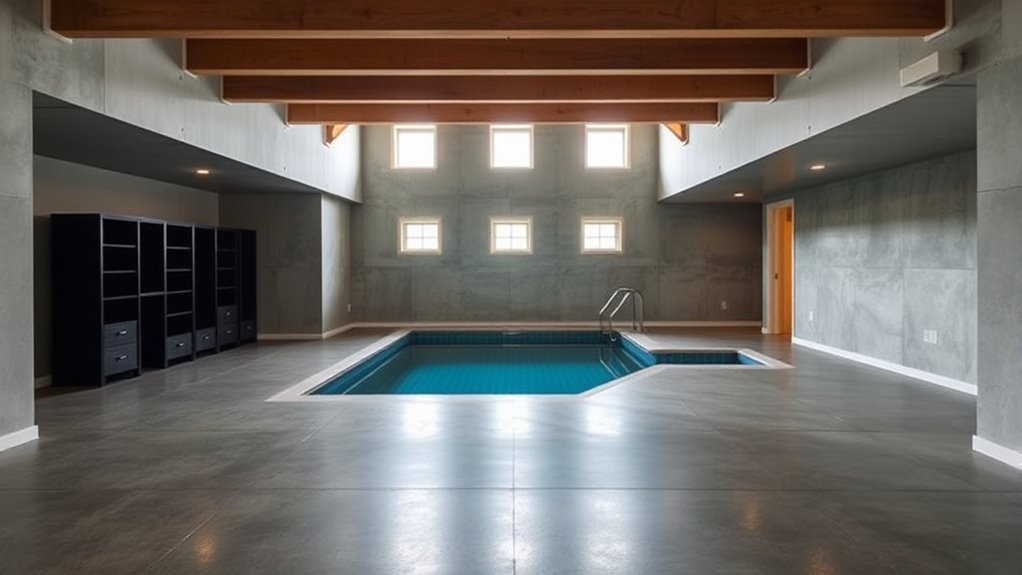
When evaluating space and layout options, start by measuring the available area accurately. Use a tape measure to note the length, width, and height of the potential spot. Don’t forget to account for doorways, windows, and any obstructions that could limit your setup. Consider how much space you need for the pool itself and for safe movement around it. Think about the placement of electrical outlets, water supply, and drainage if necessary. Visualize how the pool will fit within the room, ensuring there’s enough clearance for maintenance and access. Take photos or sketch the layout to better understand the space’s flow. Proper assessment helps you determine if your basement or garage can comfortably accommodate your endless pool, making your decision easier. Additionally, understanding space optimization techniques can help maximize your available area for a more efficient setup.
Climate Control and Temperature Regulation

Maintaining a comfortable water temperature in your pool depends heavily on effective climate control and temperature regulation. In a basement, you benefit from a naturally stable environment, often reducing the need for extensive heating. However, you still need a reliable heating system to keep the water at your desired temperature. In a garage, temperature fluctuations are more common, so investing in a high-quality heater and insulation becomes essential. Ventilation also plays a crucial role, preventing humidity buildup and mold growth. Consider installing a dehumidifier or exhaust fan to maintain proper air quality and prevent temperature swings. Consistent monitoring and adjusting your heating and ventilation systems ensure your pool remains inviting year-round, regardless of outdoor weather conditions.
Structural Considerations and Foundation Strength
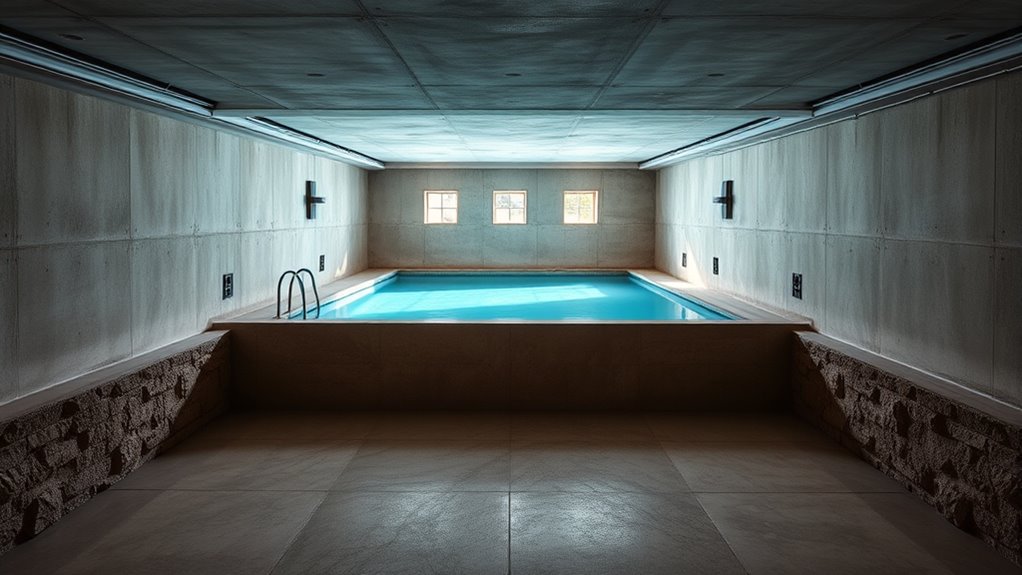
You need to assess your foundation’s load capacity to guarantee it can support your plans. Moisture problems and drainage issues can weaken the structure over time, so addressing them early is vital. Additionally, you might require structural reinforcement to meet safety standards and prevent future issues. Considering hydrogen safety protocols when planning for modifications can help ensure the long-term integrity of your space.
Foundation Load Capacity
The foundation load capacity is a critical factor that determines whether your basement or garage can safely support the structure above. You need to assess the existing foundation’s ability to bear the weight of the endless pool, including water, equipment, and users. If the foundation isn’t strong enough, it could lead to cracks, settling, or even structural failure over time. To evaluate this, consider the foundation’s material, thickness, and condition. Consulting a structural engineer is highly recommended to perform load calculations and inspections. Reinforcing or upgrading the foundation might be necessary if it falls short of supporting the pool’s weight. Ensuring adequate load capacity protects your investment and guarantees safety for everyone using the pool. Additionally, understanding the refrigeration cycle involved in maintaining pool temperature can help optimize energy use and system longevity.
Moisture and Drainage
Moisture and drainage are essential factors that directly impact the structural integrity of your basement or garage foundation. Poor drainage can lead to water pooling, which weakens the foundation over time. To guarantee proper moisture control, consider these key points:
- Assess Water Flow: Check if the area naturally directs water away from your foundation or if additional grading is needed.
- Install Drainage Systems: Use gutters, downspouts, and French drains to channel water away from the structure.
- Seal Cracks and Leaks: Regularly inspect and seal any cracks or leaks to prevent water intrusion and dampness.
Addressing moisture and drainage early helps protect your investment and keeps your endless pool dry and safe.
Structural Reinforcement Needs
Addressing moisture and drainage issues lays a solid foundation for your basement or garage, but guaranteeing long-term stability requires evaluating and reinforcing the structural components. You need to assess whether your current foundation can support the weight of an endless pool, especially if it’s in a garage or basement. Check for cracks, uneven flooring, or signs of settlement, as these indicate weaknesses. Reinforcing might involve adding beams, piers, or concrete underpinning to strengthen the foundation. If your space is old or has existing structural issues, consulting a structural engineer is essential. Proper reinforcement ensures your space can handle the additional load safely and prevent future problems like shifting or cracking. Incorporating structural reinforcement techniques can significantly improve the stability and safety of your space. Prioritize these steps to create a secure, durable environment for your pool.
Accessibility and Convenience for Daily Use
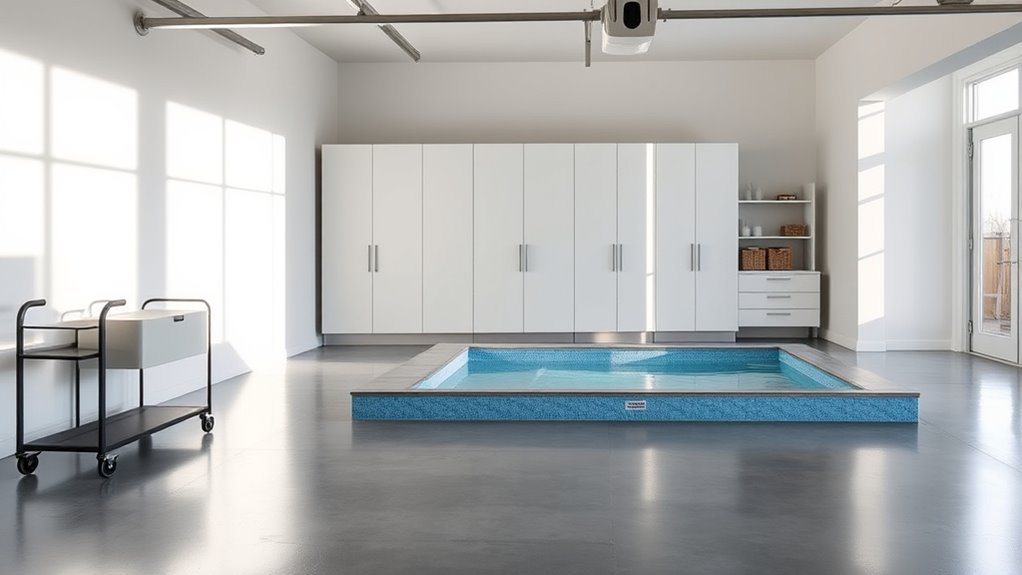
Choosing between a basement and a garage often comes down to how accessible and convenient they are for your daily routines. You want a space that fits seamlessly into your schedule. Consider these factors:
Opt for the space that best fits your daily routine and offers easy, convenient access.
- Entry points: Is it easy to walk into the space without stairs or obstacles?
- Proximity: How close is it to your main living areas or outdoor spaces you frequent?
- Ease of access: Can you quickly load and unload equipment or supplies without hassle?
- A well-organized layout can further enhance accessibility and streamline your use of the space.
A basement often provides direct indoor access, making it convenient during bad weather. A garage might be more accessible for quick dips or maintenance, especially if it’s near your driveway. Think about your daily flow to choose the spot that saves you time and effort.
Moisture Management and Ventilation Needs
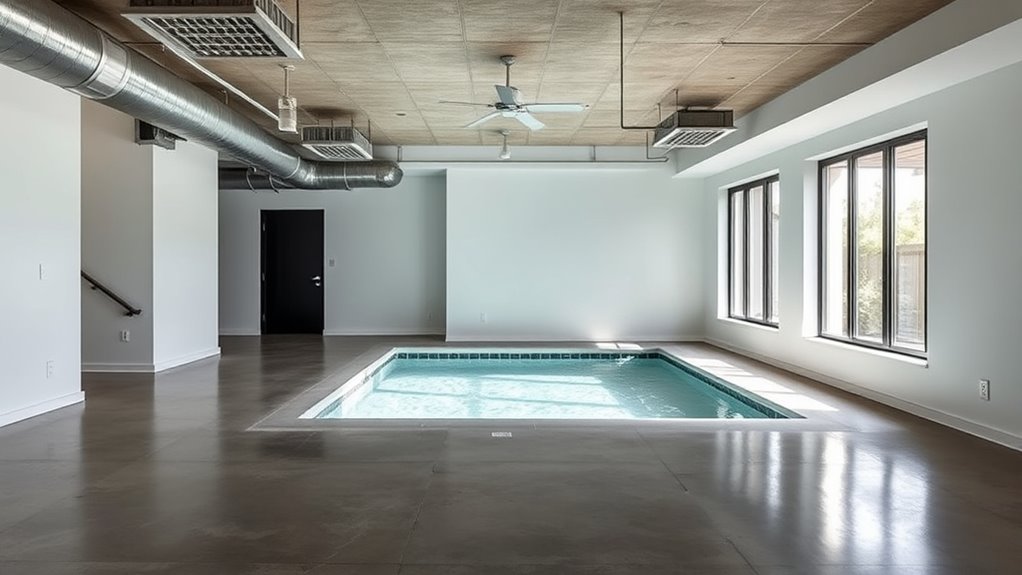
Managing moisture is key to keeping your space dry and healthy. You’ll need to implement humidity control strategies and guarantee proper airflow to prevent mold and dampness. Understanding these ventilation needs helps you create a comfortable, long-lasting environment. Incorporating proper ventilation can significantly reduce excess humidity and improve air quality.
Humidity Control Strategies
Controlling humidity levels is essential to prevent moisture buildup that can lead to mold, wood rot, and structural damage in your basement or garage. To effectively manage humidity, consider these strategies:
- Install a dehumidifier to maintain ideal moisture levels, especially in humid climates.
- Use exhaust fans or ventilation systems to remove moist air and promote airflow.
- Seal cracks and leaks to prevent outside humidity from seeping in and causing fluctuations.
These steps help create a stable environment, protecting your pool area and structural integrity. Regularly monitor humidity levels with a hygrometer, and adjust your systems accordingly. Consistent moisture control not only preserves your space but also ensures a healthier, more comfortable environment for your endless pool.
Proper Airflow Requirements
Ensuring proper airflow is essential for maintaining balanced moisture levels and preventing issues like mold and musty odors in your basement or garage. Good ventilation helps remove excess humidity generated by your pool, reducing the risk of condensation build-up. You should install exhaust fans or vents to promote continuous air exchange, especially during and after pool use. Keep windows open when possible, and consider using dehumidifiers to support airflow. Proper airflow also prevents stale air from lingering, which can affect indoor air quality and comfort. Regularly check and clean air vents and filters to keep air circulation effective. Additionally, moisture management plays a crucial role in safeguarding your space from long-term damage. By prioritizing ventilation, you’ll create a healthier environment that safeguards your space, your pool equipment, and your overall indoor air quality.
Electrical and Plumbing Infrastructure
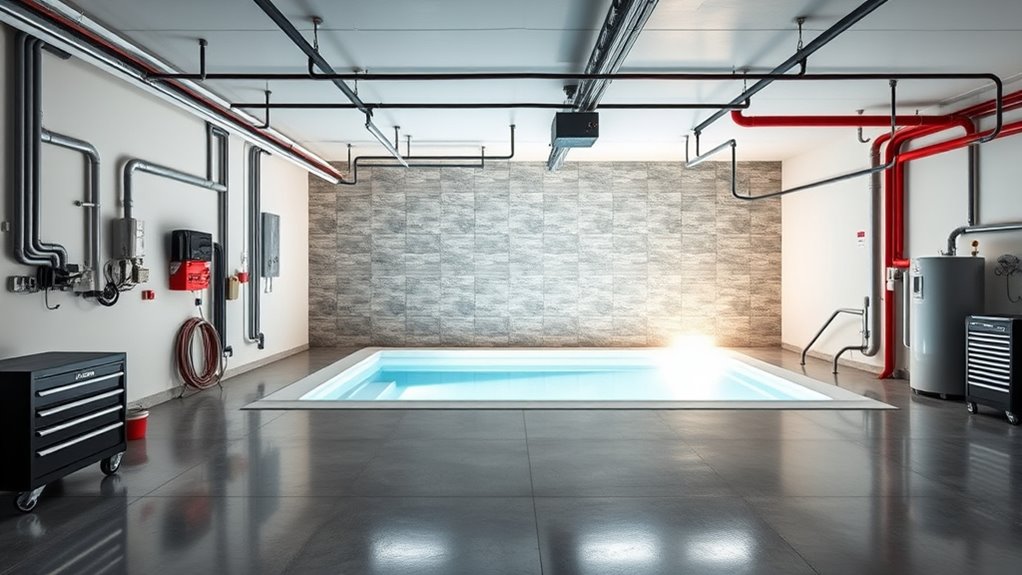
Installing reliable electrical and plumbing systems is essential for transforming your basement or garage into a functional space. Without proper setup, your endless pool won’t operate safely or efficiently. To guarantee smooth installation, consider these key steps:
Proper electrical and plumbing setup ensures your endless pool operates safely and efficiently.
- Electrical Capacity: Verify your circuit breaker can handle the pool’s power demands and install dedicated circuits to prevent overloads.
- Water Supply: Ensure existing plumbing can support the pool’s filtration and heating systems, or plan for necessary upgrades.
- Drainage and Ventilation: Incorporate proper drainage solutions for maintenance and ventilation systems to manage humidity and prevent mold.
Addressing these infrastructure needs upfront saves time and money while creating a safe, reliable environment for your endless pool. Proper planning guarantees your space functions seamlessly for years to come.
Privacy and Noise Considerations
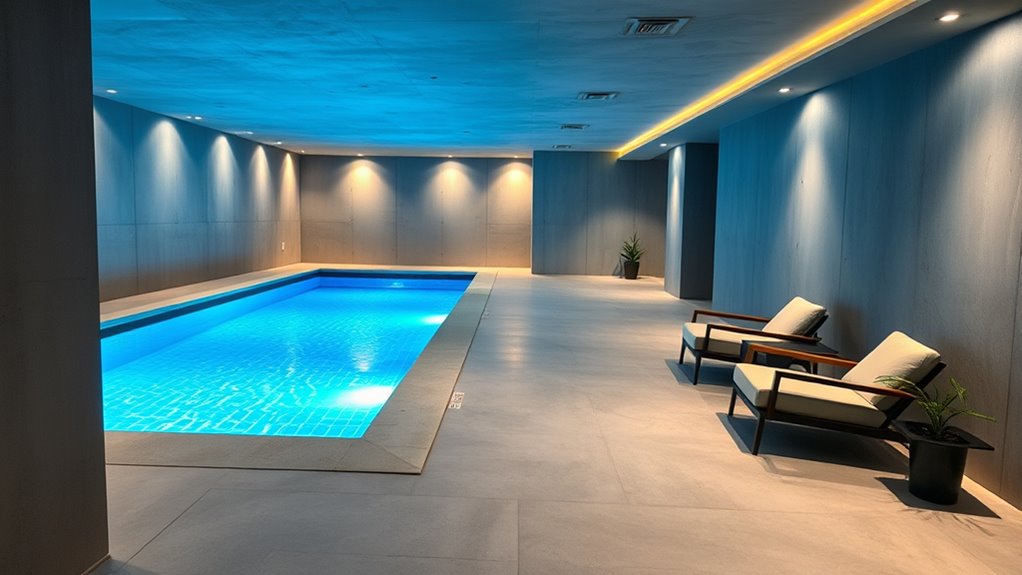
Have you considered how privacy and noise levels might impact your basement or garage conversion? If your endless pool is near shared walls or open spaces, sound can travel easily, disrupting your privacy and disturbing others. In a basement, thick walls and underground placement naturally dampen noise, making it more private. Conversely, garages often share walls with neighbors or outdoor areas, increasing sound transmission. Additionally, windows, vents, or open doors can leak noise and compromise your privacy. To mitigate this, consider installing soundproofing materials like insulation, drywall, or acoustic panels. You might also add privacy screens or curtains to create a secluded environment. Addressing these factors upfront helps ensure your pool area remains a tranquil retreat rather than a source of noise complaints or privacy concerns. Regular inspections of your electric heated mattress pad can also help prevent any safety issues related to noise or malfunction.
Cost Implications and Budget Planning

Considering the privacy and noise factors discussed earlier, it’s important to also plan how much you’re willing to spend on your basement or garage conversion. Your budget will influence the scope of your project and the quality of materials used. To keep costs manageable, consider these key factors:
- Construction costs: Demolition, foundation work, and structural modifications can vary widely.
- Permits and inspections: Budget for necessary approvals to avoid unexpected expenses.
- Finishing and equipment: High-quality finishes and pool installation costs can profoundly impact your overall budget.
Long-term Maintenance and Upkeep
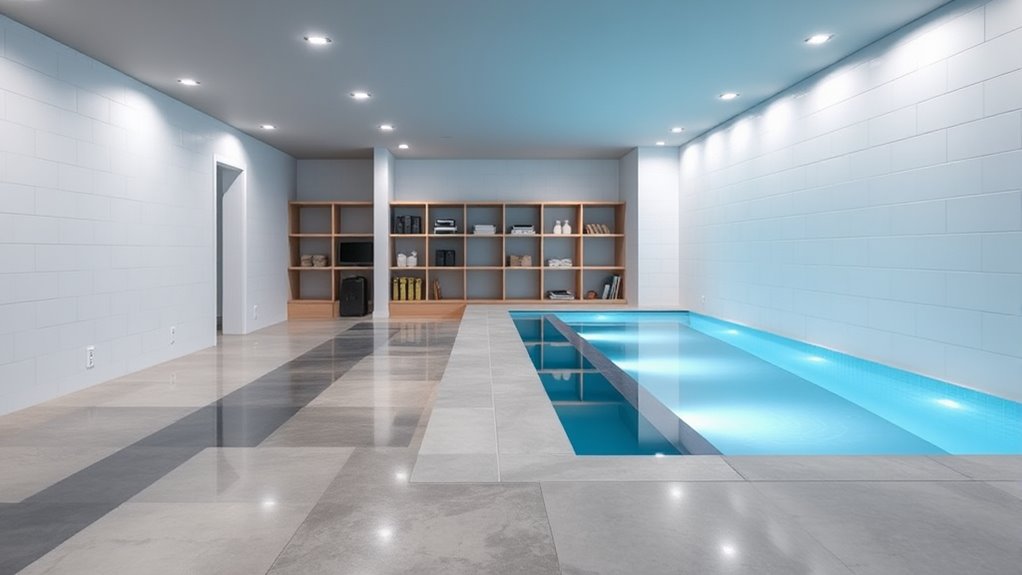
Since long-term maintenance is essential to preserving your basement or garage conversion’s functionality and appearance, it’s important to plan for ongoing upkeep from the start. Regular cleaning and inspections help prevent mold, mildew, and structural issues. For an endless pool, you’ll need to routinely check the filtration system, water chemistry, and heater to ensure everything runs smoothly. Additionally, keep an eye on humidity levels to prevent moisture damage, especially in basements. Seasonal maintenance, like draining and winterizing the pool or sealing floors, extends its lifespan. Budget for occasional repairs and replacement parts to avoid surprises. Staying proactive with maintenance not only keeps your space safe and functional but also preserves your investment over time.
Frequently Asked Questions
How Does Basement Humidity Affect Pool Maintenance?
Basement humidity can markedly impact your pool maintenance by promoting mold growth and causing condensation, which can lead to water quality issues. High moisture levels may also damage pool equipment and promote corrosion. To keep your pool in top shape, you should use dehumidifiers, ensure proper ventilation, and regularly check humidity levels. Maintaining a dry environment helps prevent costly repairs and keeps your pool clean and safe for use.
Can a Garage Accommodate an Indoor Pool Comfortably?
Yes, a garage can accommodate an indoor pool comfortably if you make proper modifications. Make certain you install good ventilation to control humidity and prevent mold, and reinforce the flooring to support the weight of the pool when filled. You might also want to add insulation to maintain temperature and reduce energy costs. With these adjustments, your garage can become a convenient, private space for your endless pool.
What Safety Measures Are Needed for Pool Installation in a Basement?
Think of your basement as a delicate ecosystem that needs protection. You should install a reliable sump pump to prevent flooding, ensure proper ventilation to avoid humidity buildup, and use waterproof materials on floors and walls. Additionally, secure electrical wiring and install ground-fault circuit interrupters (GFCIs) for safety. Regular inspections and maintenance keep your aquatic sanctuary safe, allowing you to enjoy endless swimming without worry.
How Does Natural Light Impact Pool Usage and Maintenance?
Natural light can brighten your pool area, making it more inviting and easier to enjoy during the day. However, too much sunlight can lead to algae growth and increased algae maintenance. You should consider installing window treatments or shades to control light levels, protecting your pool from excess UV exposure. Proper lighting also helps you see clearly while swimming and increases safety during nighttime use.
Are There Specific Building Codes for Pools in Garages or Basements?
Yes, there are specific building codes for installing pools in garages or basements. You need to verify local regulations, which often include requirements for structural support, proper ventilation, waterproofing, and electrical safety. It’s essential to obtain permits before installation. Consulting with a licensed contractor or local authorities ensures your setup meets all safety standards and code requirements, preventing issues during inspections or future use.
Conclusion
Choosing between your basement or garage for your endless pool is like selecting a stage for a grand performance. Think about comfort, convenience, and long-term ease. Remember, this decision shapes your sanctuary—your personal oasis. Like a lighthouse guiding a ship home, pick the spot that feels right and supports your dream. When the right space aligns with your vision, your endless pool becomes more than a feature—it becomes a haven you’ll cherish for years.

